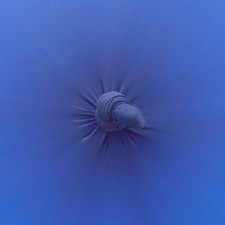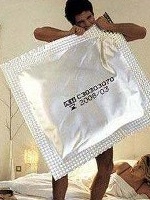High Fructose Corn Syrup
Moderator: Dictators in Training
35 posts • Page 1 of 2 • 1, 2
High Fructose Corn Syrup
A controversy is brewing over Snapple labels
Suit disputes 'all natural' claim
Friday, July 06, 2007
BY GREG SAITZ
Star-Ledger Staff
Snapple teas and juice drinks claim on their labels to be "all natural" and "made from the best stuff on Earth."
A lawsuit filed in New Jersey Superior Court and moved to federal court last week begs to differ. The complaint, filed against Snapple and its parent, Cadbury Schweppes Americas Beverages, charges the use of high-fructose corn syrup in the drinks renders the "all natural" claim false and deceptive.
"The representation that something is all natural, as far as we're concerned, requires the product be all natural," said East Brunswick attorney Philip Tortoreti, who filed the complaint on behalf of Morganville resident Stacy Holk. "And high-fructose corn syrup is not all natural."
The lawsuit, which seeks class-action status for New Jersey residents who drank certain Snapple teas and juice drinks during the past six years, wants a judge to force the company to alter its labeling and refund consumers.
If successful, the legal action could cost Cadbury Schweppes millions of dollars, based on its reported Snapple sales of more than $5 million a year in New Jersey.
The case is one of a small but growing number of actions consumers and consumer rights groups are pursuing regarding food labeling or food ingredients.
The Snapple complaint, originally filed May 18 in Superior Court in Freehold, came just months after Cadbury Schweppes said it would revise the labeling on its 7Up soda. The company made changes after receiving complaints its new ad campaign promoting 7Up as "all natural" was deceptive because the soda contains high-fructose corn syrup.
High-fructose corn syrup is made from corn starch that is processed with enzymes to create glucose and fructose. Critics of the sweetener charge it is far from natural because of the multi-step process required to create it.
"Our products and packaging meet all regulatory and legal requirements," said Chris Barnes, a spokesman for Cadbury Schweppes Americas Beverages. "The plaintiff's claims are without merit, and we plan to defend against them vigorously."
Last month, Cadbury Schweppes said it would likely sell its U.S. beverage unit and focus on its confectionery business. And yesterday, Coca-Cola said it was considering a bid to buy Snapple.
The New Jersey lawsuit also accuses Snapple of false labeling with its Acai Blackberry Juice, which has depictions of blackberries and an arrow pointing to an acai berry with the phrase, "All together now -- it's Ah-Sigh-Ee."
"Under the New Jersey Consumer Fraud Act, I don't see how they can represent this to be an acai blackberry drink when there is no acai or blackberry in the drink," Tortoreti said. "Indeed, there is only pear juice."
The attorney said this is the first lawsuit he's aware of against Snapple regarding its all-natural claims. But in the early 1990s, California health officials questioned claims by Snapple, then under different ownership, that its products were all natural, according to a report in the Los Angeles Times.
The inquiry focused on high-fructose corn syrup. Its outcome could not be determined; a spokeswoman for the California Department of Public Health said records from that period are no longer available.
The Food and Drug Administration said the term "natural" is not defined in its laws or regulations. However, "the agency has not objected to the use of the term on food labels provided it is used in a manner that is truthful and not misleading," an FDA spokesman wrote in an e-mail.
Tom Montville, a professor of food science at Rutgers University, said no chemicals are added in creating high-fructose corn syrup.
"I feel very justified in saying it's all natural," Montville said. "Among food scientists, it's a given."
But Marion Nestle, a professor of nutrition, food studies and public health at New York University and author of several books, said making high-fructose corn syrup requires more than minimal processing and doesn't qualify as natural. "I think that if it requires two separate enzyme digestions it moves it into another category," Nestle said from Australia, where she was giving a presentation. "High-fructose corn syrup is a miracle of modern food technology -- it's turning starch into sugars."
Cadbury Schweppes' labeling change on 7Up came after the Center for Science in the Public Interest threatened to sue the company. The nonprofit group also was involved in a Florida lawsuit filed against Kraft Foods earlier this year alleging Kraft's Capri Sun juice drink was deceptively marketed as all natural when it contained high-fructose corn syrup.
The lawsuit was dropped after the center learned Kraft was in the process of removing the phrase "all natural" from Capri Sun labels. Steve Gardner, litigation director for the organization, said those two cases and the Snapple lawsuit are the only legal actions he was aware of related to the issue.
The group was in contact with one of the attorneys who brought the Snapple case and at one point considered joining in the lawsuit, Gardner said. The center also is involved in a federal lawsuit in New Jersey against Coca-Cola and Nestle USA regarding their marketing and labeling of Enviga, a sweetened green tea drink that is presented as a calorie burner.
Greg Saitz may be reached at gsaitz@starledger.com or (973) 392-7946.
Suit disputes 'all natural' claim
Friday, July 06, 2007
BY GREG SAITZ
Star-Ledger Staff
Snapple teas and juice drinks claim on their labels to be "all natural" and "made from the best stuff on Earth."
A lawsuit filed in New Jersey Superior Court and moved to federal court last week begs to differ. The complaint, filed against Snapple and its parent, Cadbury Schweppes Americas Beverages, charges the use of high-fructose corn syrup in the drinks renders the "all natural" claim false and deceptive.
"The representation that something is all natural, as far as we're concerned, requires the product be all natural," said East Brunswick attorney Philip Tortoreti, who filed the complaint on behalf of Morganville resident Stacy Holk. "And high-fructose corn syrup is not all natural."
The lawsuit, which seeks class-action status for New Jersey residents who drank certain Snapple teas and juice drinks during the past six years, wants a judge to force the company to alter its labeling and refund consumers.
If successful, the legal action could cost Cadbury Schweppes millions of dollars, based on its reported Snapple sales of more than $5 million a year in New Jersey.
The case is one of a small but growing number of actions consumers and consumer rights groups are pursuing regarding food labeling or food ingredients.
The Snapple complaint, originally filed May 18 in Superior Court in Freehold, came just months after Cadbury Schweppes said it would revise the labeling on its 7Up soda. The company made changes after receiving complaints its new ad campaign promoting 7Up as "all natural" was deceptive because the soda contains high-fructose corn syrup.
High-fructose corn syrup is made from corn starch that is processed with enzymes to create glucose and fructose. Critics of the sweetener charge it is far from natural because of the multi-step process required to create it.
"Our products and packaging meet all regulatory and legal requirements," said Chris Barnes, a spokesman for Cadbury Schweppes Americas Beverages. "The plaintiff's claims are without merit, and we plan to defend against them vigorously."
Last month, Cadbury Schweppes said it would likely sell its U.S. beverage unit and focus on its confectionery business. And yesterday, Coca-Cola said it was considering a bid to buy Snapple.
The New Jersey lawsuit also accuses Snapple of false labeling with its Acai Blackberry Juice, which has depictions of blackberries and an arrow pointing to an acai berry with the phrase, "All together now -- it's Ah-Sigh-Ee."
"Under the New Jersey Consumer Fraud Act, I don't see how they can represent this to be an acai blackberry drink when there is no acai or blackberry in the drink," Tortoreti said. "Indeed, there is only pear juice."
The attorney said this is the first lawsuit he's aware of against Snapple regarding its all-natural claims. But in the early 1990s, California health officials questioned claims by Snapple, then under different ownership, that its products were all natural, according to a report in the Los Angeles Times.
The inquiry focused on high-fructose corn syrup. Its outcome could not be determined; a spokeswoman for the California Department of Public Health said records from that period are no longer available.
The Food and Drug Administration said the term "natural" is not defined in its laws or regulations. However, "the agency has not objected to the use of the term on food labels provided it is used in a manner that is truthful and not misleading," an FDA spokesman wrote in an e-mail.
Tom Montville, a professor of food science at Rutgers University, said no chemicals are added in creating high-fructose corn syrup.
"I feel very justified in saying it's all natural," Montville said. "Among food scientists, it's a given."
But Marion Nestle, a professor of nutrition, food studies and public health at New York University and author of several books, said making high-fructose corn syrup requires more than minimal processing and doesn't qualify as natural. "I think that if it requires two separate enzyme digestions it moves it into another category," Nestle said from Australia, where she was giving a presentation. "High-fructose corn syrup is a miracle of modern food technology -- it's turning starch into sugars."
Cadbury Schweppes' labeling change on 7Up came after the Center for Science in the Public Interest threatened to sue the company. The nonprofit group also was involved in a Florida lawsuit filed against Kraft Foods earlier this year alleging Kraft's Capri Sun juice drink was deceptively marketed as all natural when it contained high-fructose corn syrup.
The lawsuit was dropped after the center learned Kraft was in the process of removing the phrase "all natural" from Capri Sun labels. Steve Gardner, litigation director for the organization, said those two cases and the Snapple lawsuit are the only legal actions he was aware of related to the issue.
The group was in contact with one of the attorneys who brought the Snapple case and at one point considered joining in the lawsuit, Gardner said. The center also is involved in a federal lawsuit in New Jersey against Coca-Cola and Nestle USA regarding their marketing and labeling of Enviga, a sweetened green tea drink that is presented as a calorie burner.
Greg Saitz may be reached at gsaitz@starledger.com or (973) 392-7946.
For you


-

Evermore - NT Deity

- Posts: 4368
- Joined: Wed Mar 10, 2004 10:46 am
Hah. I hope Snapple is forced to change the label, along with all the others. Everytime someone chugs one down and justifies the idea of consuming said drinks in mass quantities by saying "It's all natural, so it's good for me" I just wanna thwapslap them upside their heads... kinda like the V8 thing, but with more gusto.
Yes Harri. The lawyers could be winning a burglar a million dollar lawsuit against an innocent because he fell over a banister and broke his back while trying to steal the crystal doorknobs off the doors upstairs.
Yes Harri. The lawyers could be winning a burglar a million dollar lawsuit against an innocent because he fell over a banister and broke his back while trying to steal the crystal doorknobs off the doors upstairs.
HyPhY GhEtTo MaMi wrote:GeT ofF mAh OvaRiEz
-

Trielelvan - NT Traveller

- Posts: 2745
- Joined: Wed Mar 10, 2004 1:11 pm
- Location: Mosquito central of da gr8 white nort'
I've always hated that "all natural" bullshit label. I hope they win and set a precedence for other lawsuits.
I like to read the labels of the stuff I buy. I bought a jug of "100% Cranberry Juice" the other day. Then I read the label... made from apple, strawberry and cranberry concentrate. Yeah, I guess they mean the cranberry juice in it is in fact 100% cranberry... 100% should mean 100%.
I like to read the labels of the stuff I buy. I bought a jug of "100% Cranberry Juice" the other day. Then I read the label... made from apple, strawberry and cranberry concentrate. Yeah, I guess they mean the cranberry juice in it is in fact 100% cranberry... 100% should mean 100%.
-

Diekan - NT Deity

- Posts: 5736
- Joined: Fri Mar 12, 2004 10:14 am
who cares, everyone knows that nothing is all natural. Even if they use water, it still has all kinds of crap in it...
They should change it to "As natural as you can get, but not all natural"
They should change it to "As natural as you can get, but not all natural"
-

kinghooter00 - Captain Google

- Posts: 1316
- Joined: Sun Nov 12, 2006 4:02 pm
- Location: Venice, Florida
kinghooter00 wrote:who cares, everyone knows that nothing is all natural. Even if they use water, it still has all kinds of crap in it...
They should change it to "As natural as you can get, but not all natural"
- Well first off, people are generally stupid. They see ALL NATURAL and assume this means the same thing as healthy. As it turns out - those two statements have absolutely nothing to do with each other. It's basically like putting ALL natural on a pack of menthols.
2nd, there is plenty of all natural food out there to eat. It takes a bit more time and research but it can happen.
-

Mop - Dictator in Training

- Posts: 4670
- Joined: Wed Mar 10, 2004 9:46 am
- Location: Who knows?
HMM, i always thought that natural means, nothings added to the natural ingredients, like adding those big crazy scientific words...
-

kinghooter00 - Captain Google

- Posts: 1316
- Joined: Sun Nov 12, 2006 4:02 pm
- Location: Venice, Florida
Zanchief wrote:Everything is all natural. Where are people getting this stuff that doesn't at some point come from nature?
It might come from natural bases, but within those mass produced beverages and foods there are ingredients that exist nowhere in nature and are soley creations that were originally made in laboratories. This is assuming that you do not define human buildings as natural, saying that they are akin to the giant termite mounds of Africa.
-

10sun - NT Drunkard

- Posts: 9861
- Joined: Sat Mar 13, 2004 10:22 am
- Location: Westwood, California
10sun wrote:Zanchief wrote:Everything is all natural. Where are people getting this stuff that doesn't at some point come from nature?
It might come from natural bases, but within those mass produced beverages and foods there are ingredients that exist nowhere in nature and are soley creations that were originally made in laboratories. This is assuming that you do not define human buildings as natural, saying that they are akin to the giant termite mounds of Africa.
But the ingredients they use in the labs have to come from somewhere? Like nature?
- Agrajag
- NT Veteran

- Posts: 1461
- Joined: Thu Apr 01, 2004 2:46 pm
- Location: Albuquerque, NM
The problem is that the FDA does not specifically discern what is categorized as "natural."
The USDA defines "natural" as any product which "contains no artificial ingredients or added colors, and is minimally processed," meaning it does not fundamentally alter the raw product, but they don't specify exactly how altered something has to be to qualify as "fundamentally altered."
Saying that something is "all natural" in the sense that it is "naturally occurring" is a far different thing than arguing whether or not it can or does come in some part from nature.
Hydrogenated Oil, like high fructose corn syrup, is created with elements and compounds that, originally in their separate forms, were naturally occurring. However, what we have done with them in order to create a stable butter substitute is anything but natural. Now, if they were to go and slap a label on a package of Country Crock (or as we say... crunchy cock... *gag*) that said "All Natural," what does that lead consumers to believe? The same thing that Snapple is doing - it leads the public to believe that what they are consuming is not only safe, but good for you, and, dare I say, healthy. This is both misleading and untrue, and it is also deliberate.
Snapple advertises their products in a way that makes them appear to be healthier alternatives to soda pop and other fruit drinks. They make big bucks off this because most people are too stupid to pay attention to what they are actually putting into their bodies.
The USDA defines "natural" as any product which "contains no artificial ingredients or added colors, and is minimally processed," meaning it does not fundamentally alter the raw product, but they don't specify exactly how altered something has to be to qualify as "fundamentally altered."
Saying that something is "all natural" in the sense that it is "naturally occurring" is a far different thing than arguing whether or not it can or does come in some part from nature.
Hydrogenated Oil, like high fructose corn syrup, is created with elements and compounds that, originally in their separate forms, were naturally occurring. However, what we have done with them in order to create a stable butter substitute is anything but natural. Now, if they were to go and slap a label on a package of Country Crock (or as we say... crunchy cock... *gag*) that said "All Natural," what does that lead consumers to believe? The same thing that Snapple is doing - it leads the public to believe that what they are consuming is not only safe, but good for you, and, dare I say, healthy. This is both misleading and untrue, and it is also deliberate.
Snapple advertises their products in a way that makes them appear to be healthier alternatives to soda pop and other fruit drinks. They make big bucks off this because most people are too stupid to pay attention to what they are actually putting into their bodies.
HyPhY GhEtTo MaMi wrote:GeT ofF mAh OvaRiEz
-

Trielelvan - NT Traveller

- Posts: 2745
- Joined: Wed Mar 10, 2004 1:11 pm
- Location: Mosquito central of da gr8 white nort'
well sure, but with that logic twinkies are all natural.
"I think you may be confusing government running amok with government doing stuff you don't like. See, you're in the minority now. It's supposed to taste like a shit taco." - Jon Stewart


-

Gypsiyee - NT Deity

- Posts: 5777
- Joined: Sun Mar 21, 2004 1:48 am
- Location: Jacksonville, FL
Gypsiyee wrote:well sure, but with that logic twinkies are all natural.
I could have sworn that they had a Yellow Dye in them?
-

10sun - NT Drunkard

- Posts: 9861
- Joined: Sat Mar 13, 2004 10:22 am
- Location: Westwood, California
they do; but my response was to arajag when he says that the stuff they use in the lab comes from nature
everything comes from somewhere, even yellow dye :p
everything comes from somewhere, even yellow dye :p
"I think you may be confusing government running amok with government doing stuff you don't like. See, you're in the minority now. It's supposed to taste like a shit taco." - Jon Stewart


-

Gypsiyee - NT Deity

- Posts: 5777
- Joined: Sun Mar 21, 2004 1:48 am
- Location: Jacksonville, FL
Gypsiyee wrote:they do; but my response was to arajag when he says that the stuff they use in the lab comes from nature
everything comes from somewhere, even yellow dye :p
Exactly. Twinkies are all natural because everything comes from nature. It's a meaningless term.
Tar is all natural. Eat up Mongoloids.
-

Zanchief - Chief Wahoo

- Posts: 14532
- Joined: Sun Jul 04, 2004 7:31 pm
Lionking wrote:HFCS is evil. We must crusade against HFCS. We must destroy the corn lobby that promotes HFCS. HFCS is killing our children. Die corn fuckers, die!
We need to stop the government from artifically inflating american sugar prices.
For you


-

Evermore - NT Deity

- Posts: 4368
- Joined: Wed Mar 10, 2004 10:46 am
lyion wrote:Frivoulous lawsuit. It's why our country is ruled by lawyers, for lawyers, and from lawyers with litigation overruling common sense.
dead on, this is absolutely 100% totally retarded, I hope the people who launched this lawsuit lose and are forced to pay all of snapple's legal fees.
- Snero
- NT Disciple

- Posts: 761
- Joined: Mon Mar 08, 2004 1:53 am
Snero wrote:lyion wrote:Frivoulous lawsuit. It's why our country is ruled by lawyers, for lawyers, and from lawyers with litigation overruling common sense.
dead on, this is absolutely 100% totally retarded, I hope the people who launched this lawsuit lose and are forced to pay all of snapple's legal fees.
I wish we'd institute the laws much of Europe has which require the suer to pay the defendents legal bills if they lose in cases like this.
-

Lyion - Admin Abuse Squad

- Posts: 14376
- Joined: Wed Mar 10, 2004 1:42 pm
- Location: Ohio
lyion wrote:Snero wrote:lyion wrote:Frivoulous lawsuit. It's why our country is ruled by lawyers, for lawyers, and from lawyers with litigation overruling common sense.
dead on, this is absolutely 100% totally retarded, I hope the people who launched this lawsuit lose and are forced to pay all of snapple's legal fees.
I wish we'd institute the laws much of Europe has which require the suer to pay the defendents legal bills if they lose in cases like this.
QFT
For you


-

Evermore - NT Deity

- Posts: 4368
- Joined: Wed Mar 10, 2004 10:46 am
35 posts • Page 1 of 2 • 1, 2
Who is online
Users browsing this forum: No registered users and 36 guests


